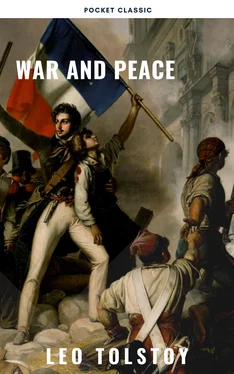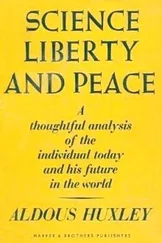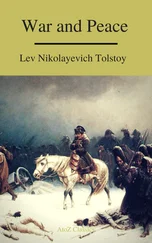Next day he woke late. Recalling his recent impressions, the first thought that came into his mind was that today he had to be presented to the Emperor Francis; he remembered the Minister of War, the polite Austrian adjutant, Bilibin, and last night's conversation. Having dressed for his attendance at court in full parade uniform, which he had not worn for a long time, he went into Bilibin's study fresh, animated, and handsome, with his hand bandaged. In the study were four gentlemen of the diplomatic corps. With Prince Hippolyte Kuragin, who was a secretary to the embassy, Bolkonski was already acquainted. Bilibin introduced him to the others.
The gentlemen assembled at Bilibin's were young, wealthy, gay society men, who here, as in Vienna, formed a special set which Bilibin, their leader, called les notres.[27] This set, consisting almost exclusively of diplomats, evidently had its own interests which had nothing to do with war or politics but related to high society, to certain women, and to the official side of the service. These gentlemen received Prince Andrew as one of themselves, an honor they did not extend to many. From politeness and to start conversation, they asked him a few questions about the army and the battle, and then the talk went off into merry jests and gossip. "But the best of it was," said one, telling of the misfortune of a fellow diplomat, "that the Chancellor told him flatly that his appointment to London was a promotion and that he was so to regard it. Can you fancy the figure he cut?… " "But the worst of it, gentlemen—I am giving Kuragin away to you—is that that man suffers, and this Don Juan, wicked fellow, is taking advantage of it!" Prince Hippolyte was lolling in a lounge chair with his legs over its arm. He began to laugh. "Tell me about that!" he said. "Oh, you Don Juan! You serpent!" cried several voices. "You, Bolkonski, don't know," said Bilibin turning to Prince Andrew, "that all the atrocities of the French army (I nearly said of the Russian army) are nothing compared to what this man has been doing among the women!" "La femme est la compagne de l'homme,"[28] announced Prince Hippolyte, and began looking through a lorgnette at his elevated legs. Bilibin and the rest of "ours" burst out laughing in Hippolyte's face, and Prince Andrew saw that Hippolyte, of whom—he had to admit—he had almost been jealous on his wife's account, was the butt of this set. "Oh, I must give you a treat," Bilibin whispered to Bolkonski. "Kuragin is exquisite when he discusses politics—you should see his gravity!" He sat down beside Hippolyte and wrinkling his forehead began talking to him about politics. Prince Andrew and the others gathered round these two. "The Berlin cabinet cannot express a feeling of alliance," began Hippolyte gazing round with importance at the others, "without expressing… as in its last note… you understand… Besides, unless His Majesty the Emperor derogates from the principle of our alliance… "Wait, I have not finished… " he said to Prince Andrew, seizing him by the arm, "I believe that intervention will be stronger than nonintervention. And… " he paused. "Finally one cannot impute the nonreceipt of our dispatch of November 18. That is how it will end." And he released Bolkonski's arm to indicate that he had now quite finished. "Demosthenes, I know thee by the pebble thou secretest in thy golden mouth!" said Bilibin, and the mop of hair on his head moved with satisfaction. Everybody laughed, and Hippolyte louder than anyone. He was evidently distressed, and breathed painfully, but could not restrain the wild laughter that convulsed his usually impassive features. "Well now, gentlemen," said Bilibin, "Bolkonski is my guest in this house and in Brunn itself. I want to entertain him as far as I can, with all the pleasures of life here. If we were in Vienna it would be easy, but here, in this wretched Moravian hole, it is more difficult, and I beg you all to help me. Brunn's attractions must be shown him. You can undertake the theater, I society, and you, Hippolyte, of course the women." "We must let him see Amelie, she's exquisite!" said one of "ours," kissing his finger tips. "In general we must turn this bloodthirsty soldier to more humane interests," said Bilibin. "I shall scarcely be able to avail myself of your hospitality, gentlemen, it is already time for me to go," replied Prince Andrew looking at his watch. "Where to?" "To the Emperor." "Oh! Oh! Oh! Well, au revoir, Bolkonski! Au revoir, Prince! Come back early to dinner," cried several voices. "We'll take you in hand." "When speaking to the Emperor, try as far as you can to praise the way that provisions are supplied and the routes indicated," said Bilibin, accompanying him to the hall. "I should like to speak well of them, but as far as I the facts, I can't," replied Bolkonski, smiling. "Well, talk as much as you can, anyway. He has a passion for giving audiences, but he does not like talking himself and can't do it, as you will see."
At the levee Prince Andrew stood among the Austrian officers as he had been told to, and the Emperor Francis merely looked fixedly into his face and just nodded to him with to him with his long head. But after it was over, the adjutant he had seen the previous day ceremoniously informed Bolkonski that the Emperor desired to give him an audience. The Emperor Francis received him standing in the middle of the room. Before the conversation began Prince Andrew was struck by the fact that the Emperor seemed confused and blushed as if not knowing what to say.
"Tell me, when did the battle begin?" he asked hurriedly.
Prince Andrew replied. Then followed other questions just as simple: "Was Kutuzov well? When had he left Krems?" and so on. The Emperor spoke as if his sole aim were to put a given number of questions- the answers to these questions, as was only too evident, did not interest him.
"At what o'clock did the battle begin?" asked the Emperor.
"I cannot inform Your Majesty at what o'clock the battle began at the front, but at Durrenstein, where I was, our attack began after five in the afternoon," replied Bolkonski growing more animated and expecting that he would have a chance to give a reliable account, which he had ready in his mind, of all he knew and had seen. But the Emperor smiled and interrupted him.
"How many miles?"
"From where to where, Your Majesty?"
"From Durrenstein to Krems."
"Three and a half miles, Your Majesty."
"The French have abandoned the left bank?"
"According to the scouts the last of them crossed on rafts during the night."
"Is there sufficient forage in Krems?"
"Forage has not been supplied to the extent… "
The Emperor interrupted him.
"At what o'clock was General Schmidt killed?"
"At seven o'clock, I believe."
"At seven o'clock? It's very sad, very sad!"
The Emperor thanked Prince Andrew and bowed. Prince Andrew withdrew and was immediately surrounded by courtiers on all sides. Everywhere he saw friendly looks and heard friendly words. Yesterday's adjutant reproached him for not having stayed at the palace, and offered him his own house. The Minister of War came up and congratulated him on the Maria Theresa Order of the third grade, which the Emperor was conferring on him. The Empress' chamberlain invited him to see Her Majesty. The archduchess also wished to see him. He did not know whom to answer, and for a few seconds collected his thoughts. Then the Russian ambassador took him by the shoulder, led him to the window, and began to talk to him.
Contrary to Bilibin's forecast the news he had brought was joyfully received. A thanksgiving service was arranged, Kutuzov was awarded the Grand Cross of Maria Theresa, and the whole army received rewards. Bolkonski was invited everywhere, and had to spend the whole morning calling on the principal Austrian dignitaries. Between four and five in the afternoon, having made all his calls, he was returning to Bilibin's house thinking out a letter to his father about the battle and his visit to Brunn. At the door he found a vehicle half full of luggage. Franz, Bilibin's man, was dragging a portmanteau with some difficulty out of the front door.
Читать дальше












